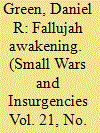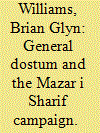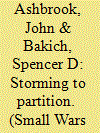| Srl | Item |
| 1 |
ID:
101335


|
|
|
|
|
| Publication |
2010.
|
| Summary/Abstract |
The successful pacification of Fallujah in 2007 during the Anbar Awakening movement was due to the coordinated efforts of US and Iraqi forces to physically and psychologically separate the people from the insurgency. Efforts along security, political, and development lines along with a robust tribal effort eliminated the armed insurgency and set the basis for victory in the area. But a synchronized delivery of these resources was insufficient to defeat the insurgency by itself absent the population's decision to turn against the insurgents. This process began to occur in 2006 and was successfully capitalized upon by Coalition Forces in Fallujah in 2007.
|
|
|
|
|
|
|
|
|
|
|
|
|
|
|
|
| 2 |
ID:
101336


|
|
|
|
|
| Publication |
2010.
|
| Summary/Abstract |
This report sheds new light on the CIA and US Special Forces' covert campaign alongside Afghan Northern Alliance leader General Dostum's horse-mounted Uzbeks during 2001's Operation Enduring Freedom. In 2003 and 2005 the author traveled over the Hindu Kush Mountains to the plains of Northern Afghanistan and lived with the legendary Northern Alliance opposition leader General Dostum. His aim was to recreate Dostum's campaign alongside the CIA and Special Forces to seize the holy city of Mazar i Sharif from the Taliban in November 2001. Based on interviews with Dostum and his Uzbek commanders, this article recreates this proxy offensive that saw the Northern Alliance opposition break out of the mountains, seize this shrine town and bring the Taliban house of cards falling down in a matter of weeks. Up until now the indigenous Afghan Uzbeks, who played a crucial role as a 'boots on the ground' fighting force for Centcom, have been cast as a mere backdrop for American heroics. Now their side of the story and their links to the mysterious shrine of Mazar i Sharif are for the first time revealed.
|
|
|
|
|
|
|
|
|
|
|
|
|
|
|
|
| 3 |
ID:
101333


|
|
|
|
|
| Publication |
2010.
|
| Summary/Abstract |
To many scholars and policymakers, 'partition' offers the most efficacious means of resolving ethnic-civil wars. Others reject partition as a solution, citing flaws (both logical and empirical) and harmful international implications should such an approach become commonplace. What has been missing from this debate is an understanding of how the process of partition unfolds. In this article we examine such a process, the case of the Krajina in the war in Yugoslavia, 1994-1995. The US aligned itself with Croatia against Serbs rebelling in the Krajina region of Croatia. The culmination of this alignment occurred in August 1995 when Croatian forces initiated 'Operation Storm' (Oluja) against Croatian Serb insurgents. Croatian forces effectively cleansed the Krajina of its Serbian population. Eager to initiate a diplomatic peace process, Washington welcomed the Croatian operation, and largely because of Operation Storm, negotiations at Dayton became possible.
|
|
|
|
|
|
|
|
|
|
|
|
|
|
|
|
| 4 |
ID:
101334


|
|
|
|
|
| Publication |
2010.
|
| Summary/Abstract |
This article examines the use of specialised plain-clothes military units in counter-terrorism, concentrating on examples involving liberal-democratic states. It analyses the benefits and problems arising from clandestine military activity, focusing in particular on British army units (notably 14 Intelligence Company and the Force Research Unit in Northern Ireland). The article concludes by arguing that such formations have a clear utility - notably in gathering intelligence on terrorist groups - but other aspects of their role are inherently controversial (notably in cases where undercover soldiers use deadly force against suspected terrorists). It also states that plain-clothes military operations need to be conducted on the basis of accountability, both for strategic reasons, and also in accordance with the norms of liberal democracy.
|
|
|
|
|
|
|
|
|
|
|
|
|
|
|
|